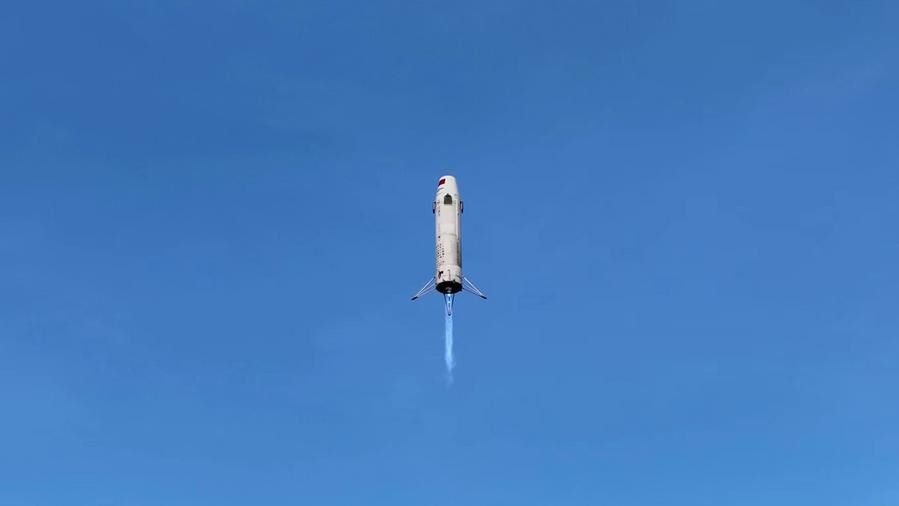
BEIJING - As China forges ahead with its high-quality development, new quality productive forces are taking center stage. One of the key players, the commercial space sector, is experiencing rapid growth and making a mark on the global stage.
In December 2023, Beijing Interstellar Glory Space Technology, better known as iSPACE, conducted another successful test of its own reusable launcher, marking a step toward a fully functional, domestically manufactured reusable rocket for China's commercial spaceflight industry.
This private Chinese aerospace company is looking to catch up with the world's most advanced rocket technologies. "There is still a long way ahead. But we're catching up fast," Anna Choi, vice-manager of iSPACE, told Xinhua in a recent interview.
READ MORE: China's first commercial space launch site gears up
In 2019, the Chinese startup successfully launched its SQX-1 Y1 rocket, sending two satellites into a 300-km circular orbit. It was the first time a private Chinese company managed to put a satellite into orbit.
Its test on Dec 10 last year verified the Hyperbola-2Y as a reusable liquid oxygen and methane carrier rocket -- the first of its kind in the country. It is part of an iSPACE plan to launch a reusable medium-lift rocket into orbit in late 2025.
Since its inception in 2016, the company's staff has expanded from less than 10 to more than 400 people.
Choi said both the company and the industry are growing at a fast pace, propelled by technological innovation and catalyzed by the government's supportive policies.
iSPACE is one of several Chinese enterprises active in the commercial aerospace industry in recent years. The country has experienced an explosion of commercial space companies since 2014, driven by the government's opening up of the sector to private capital.
According to media reports, in 2023 alone, the country's private commercial spaceflight companies managed more than 10 successful launches.
READ MORE: China's new mega-constellation a milestone in satellite internet
Like iSPACE, most of these enterprises are headquartered in Beijing, attracted by the capital's rich talent pool and supportive policies.
Beijing in February 2024 announced plans to establish a dedicated "Rocket Street" as a research and production hub for advancement of the commercial aerospace sector. Construction started last month at the Beijing Economic-Technological Development Area (BDA), located in a southeastern suburb of Beijing.

"Through the 'Rocket Street' program, we hope to leverage the cluster advantage to facilitate the development of the sector," said a BDA official.
The capital city's endeavor to foster the commercial aerospace sector comes amid the country's efforts to develop new quality productive forces to help advance the world's second-largest economy up the global value chain. Developing commercial spaceflight was listed among the key areas for development in China's government work report this year.
ALSO READ: Large cargo drone makes maiden flight
These priorities, which also include bio-manufacturing, the low-attitude economy, quantum technology and life sciences, form part of the country's agenda to pursue sustainable growth through developing strategically important and future-oriented industries.
Reflecting the rising level of government support, Choi said the municipal government provided subsidies for the commercial aerospace industry to set up innovation centers focusing on developing reusable rockets. The government is also striving to encourage more private capital investment in this sector.
Besides Beijing, multiple other regions and cities in China have also announced plans to develop the commercial aerospace industry.
"This is a sector that requires pioneering courage. We are committed to innovation and confident for the catch-up and beyond," Choi said.


